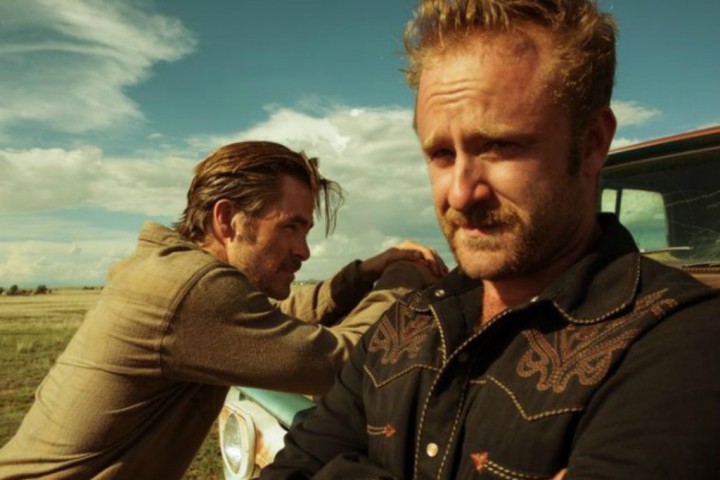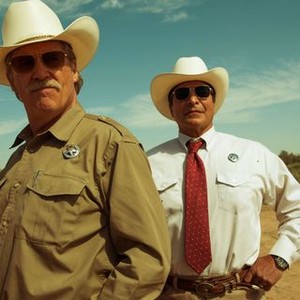Hell or High Water is a film that wears its genre influences on its sleeve. Yes, it’s a post-modern revisionist Western; but it’s also a road movie, a heist movie and bears more than a passing resemblance to ’30s and ’40s gangster pictures and film noir with a heavy dose of ’70s social realism thrown in for good measure. And yet, Hell or High Water is very much its own fim. Yes, its subject matter might be slightly derivative, but it is decidedly not a film beholden to its antecedents. Director David MacKenzie and writer Taylor Sheridan have crafted a singular film greater than the sum of its genre constituents, and the result is a must-see antidote to late-summer blockbuster fatigue.
Perhaps the single most impressive feat that Mackenzie accomplishes with Hell is the capacity to deliver exposition through purely cinematic means. His opening shot establishes the film’s setting, tone and a good deal of the premise before a word is ever spoken. Dialogue is used primarily to elucidate character and, only secondarily, to move the story forward, with the majority of those duties being carried out by laconic long-takes and carefully composed anamorphic tracking shots. The shadow of Welles looms large, as do the fingerprints of Don Siegel and Sam Peckinpah, but Hell is a profoundly different film than Touch of Evil or Charley Varrick or Pat Garrett and Billy the Kid. As a filmmaker, MacKenzie manages to avoid the easy shortcuts of most action-oriented thrillers of this ilk, instead using violence and spectacle sparingly to punctuate tension. MacKenzie was already on my list of rising directors to watch after last year’s stirring (and disturbing) prison drama Starred Up. Hell has only reaffirmed that opinion.
As with Starred, Hell focuses primarily on male relationships, clearly a significant theme in MacKenzie’s nascent metier. However, explorations of the brotherly bond between Chris Pine and Ben Foster as bank-robbing biological brothers, as well as that between Jeff Bridges and Gil Birmingham as the U.S. Marshal brothers-in-arms tasked with bringing them down, both owe more to Sheridan’s script than to MacKenzie’s direction. And that script is an understated masterpiece of narrative economy, leaning heavily on Cormac McCarthy and Larry McMurtry in its evocation of a West Texas hill country as gritty and unforgiving as the characters that populate it, without belaboring the point. Like Sheridan’s last film, Sicario, this is a crime thriller with a Texan setting and a world made up of deeply flawed characters. But unlike that story, Hell is a more mature, grounded and personal work. This is a complex script, which thematically analogizes the theft of ancestral lands from Native Americans with the economic slight-of-hand that led to largely a similar outcome, at least in principle, for the modern American middle class in the wake of the Great Recession — an analogy that, if mishandled, could have been painfully blunt and obtrusive. In short, there’s a reason why Sheridan’s script sat atop the fabled “Black List” of great unproduced screenplays in 2012, and I for one am grateful that this film finally came to fruition without being botched.
The aforementioned central cast is uniformly outstanding, in ways I expected as well as ways I didn’t. Jeff Bridges seems justifiably pleased with his late-career renaissance as a specialist in Westerns, and if he wanted to act in nothing else from now on, I’d still watch them all. Gil Birmingham has always been a consistently reliable supporting actor, but he brings a level of nuance to his ball-busting exchanges with Bridges that I don’t recall having seen from him in years. And Chris Pine is so suitably stoic as the straight-man of this piece that I’m shocked to say I’m beginning to wonder if there might not be more to him than his soulless turn as Captain Kirk would suggest. But Ben Foster is by far the standout here in his anarchic role as Pine’s unpredictable ex-con older brother, reveling in the chaotic confidence of his character and supplying some much needed comedic diversion in an otherwise almost unbearably heavy film.
Hell or High Water may not be the feel-good hit of the summer, although I know it certainly made me feel good to come across a film with plenty of moral ambiguity, but no ambiguity about its own nature. The film’s pacing and texture are definitively in the classical genre mold, but there’s something more thoughtful at play in Hell than its exploitation cinema trappings might lead one to believe. Masterful execution and one of the most gratifying endings I’ve seen in some time make Hell required viewing. Rated R for strong violence, language throughout and brief sexuality
Opens Friday at Carolina Cinemark









Before you comment
The comments section is here to provide a platform for civil dialogue on the issues we face together as a local community. Xpress is committed to offering this platform for all voices, but when the tone of the discussion gets nasty or strays off topic, we believe many people choose not to participate. Xpress editors are determined to moderate comments to ensure a constructive interchange is maintained. All comments judged not to be in keeping with the spirit of civil discourse will be removed and repeat violators will be banned. See here for our terms of service. Thank you for being part of this effort to promote respectful discussion.